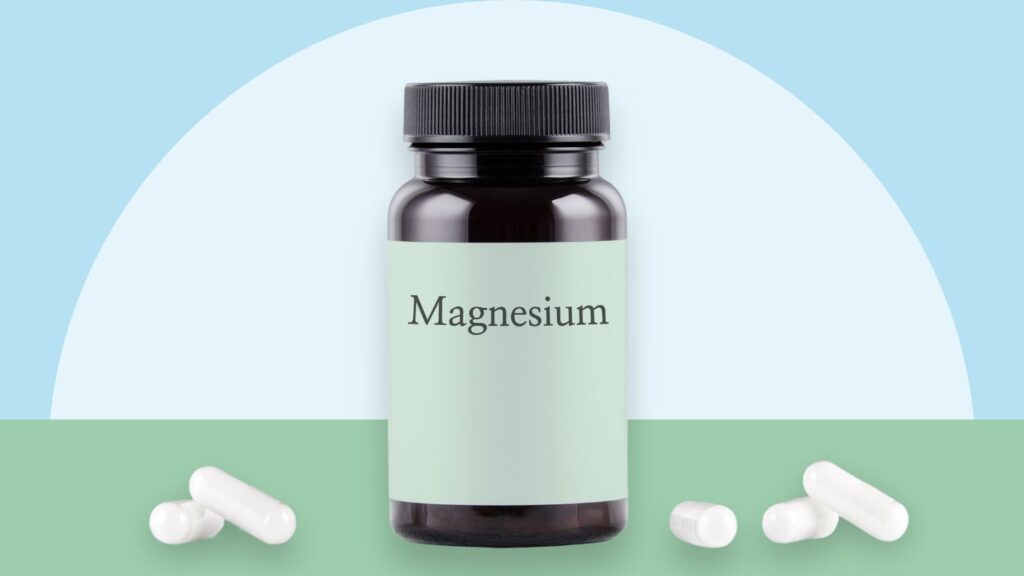**Note:** The U.S. Food and Drug Administration (FDA) does not approve supplements for safety or effectiveness. Talk to a healthcare professional about whether a supplement is right for your individual health, and discuss any potential drug interactions or safety concerns.
—
# Magnesium: Essential Mineral for Health
Magnesium is an essential mineral that plays a key role in muscle and nerve function, heart rhythm, blood pressure regulation, and blood sugar control. It is involved in hundreds of biochemical processes in your body and may help support bone health and energy production.
While most people can get enough magnesium through their diet, supplements may benefit those with deficiencies or certain health conditions. Here’s what you need to know about daily magnesium requirements, dietary sources, and when to consider supplementation.
—
## Potential Health Benefits of Magnesium
Magnesium supports hundreds of bodily functions impacting everything from energy production to cardiovascular health.
> “Magnesium supports so many essential functions: muscle and nerve activity, heart rhythm, blood sugar control, and sleep regulation,” says Raj Dasgupta, MD, associate professor of clinical medicine at the University of California, Riverside, School of Medicine.
> “Some research even links it to lower blood pressure and better mood.”
Ashley Koff, RD, founder of The Better Nutrition Program, notes that while research on magnesium is robust, some studies are influenced by the specific forms of magnesium funded by different companies, which can skew evidence.
With that in mind, here are several science-backed benefits of magnesium:
### 1. Supports Heart Health
Magnesium helps regulate heart rate and blood pressure. Low magnesium levels are linked to higher risks of atherosclerosis, coronary artery disease, arrhythmias, and heart attack. Some studies also associate healthy magnesium levels with a lower incidence of stroke. However, these findings mostly come from observational studies, so more long-term research is needed to confirm causation.
### 2. May Help Prevent or Manage Type 2 Diabetes
Higher magnesium levels are associated with a reduced risk of type 2 diabetes. “If you’ve been diagnosed with insulin resistance or prediabetes, extra magnesium may help,” says Robin Foroutan, RDN, an integrative dietitian in New York City. Supplementation may also support heart health in people with diabetes.
### 3. Might Strengthen Bones
Magnesium is essential for bone formation and helps regulate calcium and vitamin D, both crucial for bone density. A review of 28 studies reported that low magnesium intake is linked to lower bone mineral density and a higher risk of fractures.
### 4. Could Ease Migraine Symptoms
Research suggests magnesium supplementation can reduce the frequency and severity of migraines. People with migraines often have lower magnesium levels, and correcting deficiencies may counteract migraine-related mechanisms such as inflammation and nervous system excitation.
### 5. Could Boost Mood
Some early studies suggest higher magnesium levels improve mood and energy, although more research is needed. Low magnesium is associated with a higher risk for depression, and supplementation might improve symptoms.
### 6. Could Improve Sleep Quality
There is some evidence that magnesium supplementation promotes better sleep by helping with faster sleep onset, longer duration, and reduced snoring. However, study results are inconsistent, and larger trials are necessary.
—
## Magnesium and Weight Management
Magnesium is not a weight loss supplement but can support weight management.
> “There’s no strong proof that magnesium alone will help you lose weight,” says Dr. Dasgupta.
> “That said, it supports factors that make weight loss easier, like improving sleep and managing blood sugar.”
Adequate magnesium intake also supports muscle function and bone strength, which are important for maintaining muscle mass during fat loss, notes Koff.
—
## Potential Risks and Side Effects of Magnesium
Magnesium supplements are generally safe when taken as directed but understanding possible risks and side effects is important.
### Risks
– People with kidney problems need caution; impaired kidney function can hinder magnesium elimination, leading to toxicity.
– Magnesium can interfere with medications like bisphosphonates, certain antibiotics, diuretics, and proton pump inhibitors. Consult your doctor if you take these.
### Common Side Effects
– Diarrhea
– Nausea
– Abdominal cramping
### Serious Side Effects
Very high doses (usually above 5,000 mg per day) can cause irregular heartbeat, difficulty breathing, very low blood pressure, or heart attack.
—
## Forms of Magnesium Supplements
Choosing the right form of magnesium is important, as absorption rates and side effects vary:
– **Better absorbed forms:** Magnesium aspartate, lactate, chloride, citrate.
– **Less well-absorbed forms:** Magnesium oxide, magnesium sulfate.
– Some forms (magnesium oxide, carbonate, chloride, gluconate) can cause diarrhea, which can be helpful if treating constipation.
– **Magnesium threonate** may pass into the brain more efficiently, making it useful for mood, sleep, and cognition concerns.
Magnesium supplements come in various formats including capsules, gummies, powders, and drinks. Gummies often have added sugars and artificial flavors. Absorption depends mainly on the magnesium form used.
—
## Food Sources of Magnesium
Experts recommend getting magnesium primarily from food since whole foods provide a full range of nutrients that work synergistically.
Some of the best magnesium-rich, high-fiber foods include:
– Pumpkin seeds (roasted): 156 mg per 1 oz
– Chia seeds: 111 mg per 1 oz
– Boiled spinach: 78 mg per ½ cup
– Roasted cashews: 74 mg per 1 oz
– Cooked black beans: 60 mg per ½ cup
– Cooked, shelled edamame: 50 mg per ½ cup
– Peanut butter: 49 mg per 2 tablespoons
– Baked potato with skin: 43 mg per 3.5 oz
– Plain low-fat yogurt: 42 mg per 8 oz
– Bananas: 32 mg each (medium)
– Milk: 24-27 mg per 1 cup
– Atlantic farm-raised salmon: 26 mg per 3 oz cooked
—
## Recommended Daily Magnesium Intake
The Recommended Dietary Allowances (RDAs) vary by age, sex, and life stage, accounting for intake from all sources including food and supplements.
### Women
– Ages 14-18: 360 mg/day
– Ages 19 and older: 310-320 mg/day
– Pregnant teens: 400 mg/day
– Pregnant women: 350-360 mg/day
– Breastfeeding teens: 360 mg/day
– Breastfeeding women: 310-320 mg/day
### Men
– Ages 14-18: 410 mg/day
– Ages 19 and older: 400-420 mg/day
### Infants
– Up to 6 months: 30 mg/day
– 7-12 months: 75 mg/day
### Children
– Ages 1-3: 80 mg/day
– Ages 4-8: 130 mg/day
– Ages 9-13: 240 mg/day
**Upper Limits:**
The upper safe limit for magnesium from supplements or medications (not food) is:
– Ages 1-3: 65 mg/day
– Ages 4-8: 110 mg/day
– Ages 9 and older: 350 mg/day
—
## The Takeaway
Magnesium is essential for over 300 biochemical reactions, supporting muscle, nerve, bone, heart, and metabolic health. Many people do not get enough from their diet alone.
Magnesium supplements can help, but not all forms are equal. Chelated forms like magnesium glycinate, malate, and threonate are generally better absorbed and gentler on the digestive system.
Always consult your healthcare provider before starting magnesium supplements, especially if you have kidney issues or take medications that could interact.
—
## FAQ
**Why do I need magnesium?**
Magnesium is involved in over 300 enzymatic reactions. It regulates blood pressure, calcium, and blood glucose levels, supports nerve conduction, muscle contraction, immune function, and bone integrity.
**What are symptoms of low magnesium?**
Mild symptoms include tremors, fatigue, and weakness. Severe deficiency can cause seizures, delirium, and irregular heart rhythm. Conditions like kidney disorders, alcohol use disorder, uncontrolled diabetes, and inflammatory bowel disease increase risk.
**What are the risks and benefits of magnesium supplements?**
Supplements are generally safe but may cause diarrhea, cramps, and nausea. Benefits include support for heart/bone health, migraine relief, mood improvement, better sleep, and diabetes management. Talk with your doctor before starting.
**What foods are rich in magnesium?**
Leafy greens (spinach), nuts and seeds (pumpkin seeds, cashews), legumes (black beans), soy (edamame), fatty fish (salmon), and dairy (milk, yogurt) are good sources.
**How much magnesium do I need?**
Women aged 19-30 need 310-320 mg/day; men the same age need 400-420 mg/day. Pregnant and breastfeeding individuals require slightly more.
—
## Editorial Sources
Everyday Health follows strict sourcing guidelines to ensure accuracy. Our content is based on peer-reviewed studies, expert medical sources, and information from reputable institutions.
—
## Resources
– Magnesium. National Institutes of Health Office of Dietary Supplements. June 2, 2022.
– Fritzen R et al. Magnesium Deficiency and Cardiometabolic Disease. *Nutrients*. May 17, 2023.
– Soriano-Pérez L et al. Magnesium and type 2 diabetes mellitus: Clinical and molecular mechanisms. *Health Sciences Review*. September 2022.
– Xu L et al. Effects of Magnesium Supplementation on Improving Hyperglycemia… *Frontiers in Nutrition*. January 18, 2023.
– Rondanelli M et al. An update on magnesium and bone health. *Biometals*. May 6, 2021.
– Magnesium and Migraine. *Nutrients*.
– Dominguez LJ et al.
– Zhao W et al. Magnesium depletion score and depression: a positive correlation. *Frontiers in Public Health*. November 5, 2024.
– Arab A et al. The Role of Magnesium in Sleep Health. *Biological Trace Element Research*. January 2023.
– FDA 101: Dietary Supplements. U.S. Food and Drug Administration. June 2, 2022.
– Should You Take Gummy Vitamins? UCLA Health. December 12, 2022.
—
## Meet Our Experts
**Lynn Grieger, RDN, CDCES – Medical Reviewer**
A registered dietitian-nutritionist and certified diabetes educator with expertise in nutrition, exercise, and behavior change. She has contributed to numerous health publications and is passionate about nutrient-dense, great-tasting foods and outdoor activity.
**Julie Lichty Balay, RD, CSSD – Author**
Julie Balay is a registered dietitian and board-certified sports dietitian with extensive experience in nutrition education, motivational speaking, and counseling diverse clients. She emphasizes permanent behavior change, balanced living, and evidence-based supplementation.
—
By incorporating magnesium-rich foods and considering supplements when needed, you can support your overall health and well-being. Always consult a healthcare professional for personalized advice.
https://www.everydayhealth.com/diet-nutrition/magnesium/

